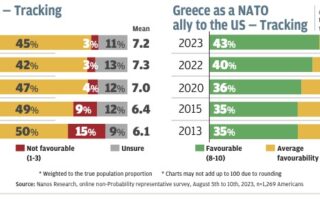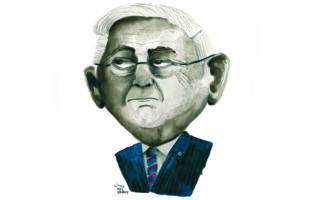Snapshots of Joe Biden’s journey
The outgoing president’s strong ties to the Greek-American community and deep understanding of Greek affairs

Joe Biden’s decision not to seek re-election, which was both inevitable and overly delayed, was somewhat inelegantly imposed on a man who has been a dominating presence on the American political scene for decades, over the course of which he developed a strong relationship with the Greek-American community.
Biden is one of the few US politicians with such extensive experience on the geopolitical chessboard. He personally knows numerous heads of state, from major powers to smaller nations.
Whether or not one has agreed with the policies he advocated as a legislator or followed as vice president and president, the fact is that his colleagues from both major parties have often consulted him on international developments.
For those of us who have watched him in Senate hearings, his role has often been decisive. His imposing presence, along with his charisma, knowledge and experience, have made him stand out.
He has formed friendships with prominent Republican officials, notably a close relationship with the late John McCain, Barack Obama’s opponent in the 2008 presidential election.
During his long tenure in the Senate, I happened to be present at several of his conversations with leading figures of the Greek-American community.
He charms you with his ease and humor while being deeply committed to his party’s beliefs and ideology. At the same time, he is pragmatic, willing to seek common ground with his opponents.
Before the political climate became increasingly toxic over the last decade, he was one of the Democrats who frequently led efforts to reach compromises with moderate Republicans. Actually, he has continued to do so even as president.
Moreover, he is a unique political figure who genuinely cares about ordinary people – something rather unusual nowadays. He exudes a sincere, not contrived, sensitivity.
He is an American president who genuinely understands Greece, Cyprus, and their challenges – something that is sadly more of an exception than the norm
The personal tragedy he experienced early in his political career – when his first wife and their baby were killed in a car accident just days before he was sworn in as a first-time senator – left an indelible mark on him.
Despite spending his entire life in the corridors of power – 36 years as a senator, eight years as vice president, and four years as president – he also had a somewhat “anti-establishment” side. Maybe it was the way he communicated with the public, often introducing himself simply as “Joe” or his frequent rhetorical gaffes that made him relatable to people.
He chaired committees, including the significant, for Greek interests, Foreign Relations Committee. He was one of the few who was well-acquainted with politicians in both Greece and Cyprus, countries he visited multiple times.
In December 2014, when Nicos Anastasiades, the president of Cyprus at the time, was hospitalized in New York, he visited him at the hospital.
His long-standing relationship with the Greek-American community inspired him, as a senator, to actively support and sign resolutions on Greek issues related to the Aegean, Cyprus and the Patriarchate.
He built lasting friendships with influential Greek Americans – some of whom competed for recognition as having the closest ties to the president – and personally knew all of America’s Greek Orthodox archbishops, starting with the late Archbishop Iakovos.
Particularly sensitive to religious freedom issues, he has been sharply critical of Ankara regarding the Ecumenical Patriarchate over the past decades. In an interview with Kathimerini, he stated, “There is no justification whatsoever for the treatment of the patriarch.”
I recall him becoming emotional at a 2008 gathering with Greek Americans in Congress while he was still campaigning for the Democratic nomination, which he ultimately lost to Barack Obama, who later selected him as vice president. This happened when he spoke from the heart and expressed his gratitude to the Greek community leaders he personally knew and had worked with for their support over the years, starting with his first election to the Senate at the age of just 29.
He recalled with emotion his initial bid for the Democratic presidential nomination in 1988, when he was one of seven candidates, competing against Mike Dukakis, who, of course, had the support of the Greek-American community. Despite this, they continued to support him as well, and he expressed his gratitude for their loyalty: “You had told me that you would support Mike, but also that I was your second choice and you would still assist me. And you did. It’s something I will never forget.”
He maintained good relations and communicated effectively with both the business community and labor unions. You could see this in his body language. At another Greek-American event, a fellow senator praised him as one of the few politicians who was comfortable and effective “with both Wall Street and Main Street.”
Finally, although he was forced to forgo re-election – not because of his policies, but primarily due to his age and health issues – Biden has made a significant impact during his single term as president. He effectively managed the pandemic, introduced measures for vulnerable social groups, and secured the largest-ever funding for environmental protection.
His political opponents argue that these achievements came at the expense of the budget. Regardless, Biden leaves a strong imprint on America’s contemporary political landscape.
Regarding the Greek community, while Joe Biden may not have resolved our issues or been the ultimate supporter we would have hoped for, he has been an American president who genuinely understands Greece, Cyprus, and their challenges – something that is sadly more of an exception than the norm.
Cyprus is an ‘unresolved and unremitting injustice’
In an interview with Kathimerini while he was still a senator, Biden described the Turkish occupation of Cyprus as an “anomaly” and “the only truly unresolved and unremitting injustice that exists in that whole area,” stating that he was “among those who believed, and I still believe, that we could have, and can now, play a more active role in Cyprus. I told this to the then Turkish prime minister when he attended the Foreign Relations Committee and asked for my opinion on the matter. He requested complete honesty from me, and I delivered.”
He added that “the US should make absolutely clear that the basis of the relationship is impacted upon by how Cyprus is resolved, Turkey disengaging completely, and how disputes between Greece and Turkey in the Aegean are settled.” His expression indicated that he genuinely believed this, rather than simply said it because he was speaking to a Greek journalist.
Unsurprisingly, geopolitical calculations and interests often complicate the implementation of policies and can even undermine the intentions of presidents.






